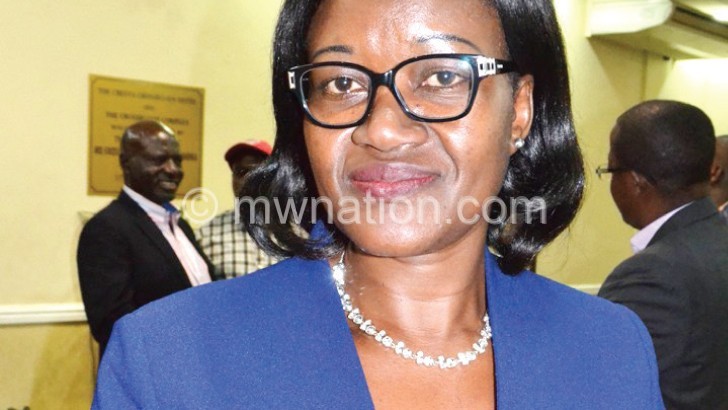‘No Rwandan should be a refugee for the time being’
Last week, the Rwandan High Commissioner to Malawi, Mozambique, Zambia and Zimbabwe, Monique Mukaruliza, presented her letters of credence to President Peter Mutharika. Later, Mukaruliza interacted with the Rwanda community at Crossroads Hotel in Lilongwe. Our reporter WATIPASO MZUNGU engaged her on the meeting, resentment among Hutus and Tutsis at Dzaleka Refugee Camp in Dowa and other issues. Excerpts:

and Tutsi. We are all Rwandans
Q
: What was the main objective of your interaction with the Rwandan community?
A
: You know that I am the High Commissioner of the Republic of Rwanda to the Republic of Malawi. Today, I presented my letters of credence to His Excellency the President of Malawi. So, at this important occasion, I had to meet the Rwandan community here. Because when a country opens/establishes an embassy, it is, of course, for the well-being of its citizens living in those countries. So, that’s why today at the occasion of the presentation of my credentials, I had to meet the Rwandan community living in Malawi.
Q
: What would you say regarding the legal status of Rwandan nationals living in Malawi as asylum seekers or refugees?
A
: You know that the Government of Rwanda understands that at a certain time, immediately after the genocide against the Tutsi, there was a reason for Rwandans to be refugees in the neighbouring countries or a bit far. But for now, Rwanda is safe. Security is full (tight) in Rwanda. The United Nations has even accepted the status closed; meaning that no Rwandan should be a refugee for the time being.
So, the position of Rwanda is that the nationals for Rwanda living abroad should have to choose either to come back to Rwanda—that is voluntary repatriation—or to stay in the host countries, but comply with the laws of the host countries. So, the Rwandan mbassies in the countries where we have Rwandan former refugees—because for today we don’t have Rwandan refugees in these countries—are facilitating Rwandans living in those countries to get Rwandan official documents so that they can either stay in those countries if the laws allow and be integrated in these countries. Or if the laws of the host country don’t allow, the Rwandan should get their official documents and come back to Rwanda.
But the position is contrary to what has been said by people who don’t understand. The position of Rwanda is not a forced repatriation. It’s for Rwandans to choose between coming back to the country [Rwanda] because the country is developing well. And everybody has his place and value in the country. Or choose to stay in the host country if the laws allow that.
Q
: Okay! Recently, there have been reports of criminal activities and fighting between Hutus and Tutsis at Dzaleka Refugee Camp. Is your office aware of this issue?
A
: We are not aware of those conflicts because now in Rwanda we don’t have Hutu and Tutsi. We are all Rwandans. This is what we are sensitising every Rwandans living abroad. We are one. We are now focusing on the development of the country and the well-being of all citizens. So, if the incident happened in the refugee camp, we are not aware and really, it would be regrettable if that happened.
Q
: What is your office doing to ensure that Rwandan nationals living abroad, but interested to take part in the August 2017 vote are given the opportunity to vote for their preferred candidates?
A
: All Rwandans that are interested to take part in the presidential elections have got enough time to register. Those who have registered have indicated where they should go for voting. So, some of them will go to Rwanda while others will come to Lusaka (Zambia) to cast their ballots. But everybody who was interested had the opportunity to register so that they can participate in the presidential elections.
Q
: And who is going to foot their travel expenses/bills?
A
: No! It is patriotism. They don’t have to ask for any kind of support because they understand that they have the right to vote and it’s also good for every Rwandan to elect his or her own preferred presidential candidate.
Q
: During the presentation of your letters of credence to President Mutharika, did you raise the issue about the need to integrate Rwandan nationals interested to live their entire life in Malawi?
A
: No! This is the United Nations decision. It has been negotiated and being implemented by the UNHCR (UN High Commissioner for Refugees) together with Rwanda and the host country. So, it is not a Rwandan decision. It’s a United Nations decision.
Q
: What are you going to do to ensure that Rwandans suspected to have committed various criminal activities during genocide and are currently in Malawi are repatriated back to your country?
A
: You know the Extradition Treaty is an agreement signed by two countries. It is not only one way. The Extradition Treaty did not only target a Rwandan who has committed either genocide or other crimes against humanity. It’s a reciprocal agreement; meaning that even for a Malawian who has committed a crime and is in Rwanda, Malawi will also ask Rwanda to repatriate that person. So, it should not be understood as if it was a target of only Rwandans who have committed genocide or other crimes against humanity. n





